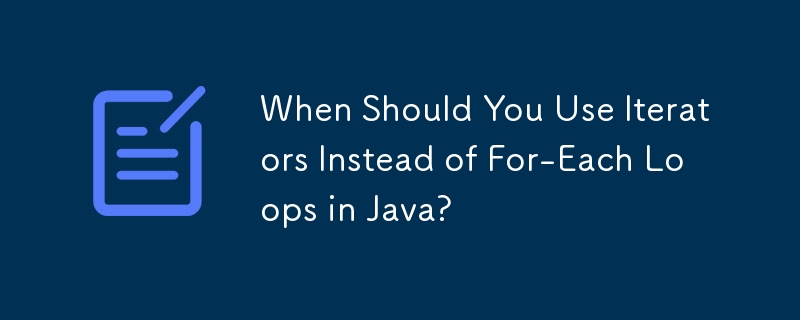Home >Java >javaTutorial >When Should You Use Iterators Instead of For-Each Loops in Java?
When Should You Use Iterators Instead of For-Each Loops in Java?
- Mary-Kate OlsenOriginal
- 2024-11-14 21:23:02460browse

For-Each Loops vs. Iterators: Efficiency Considerations
In Java, traversing a collection can be done in multiple ways, one of which is using for-each loops or iterators. It's worth comparing their efficiency to make an informed choice.
For-Each Syntax vs. Iterator
The new for-each loop syntax, introduced in Java 5, is a specialized shortcut for using an iterator. Under the hood, it iterates over the collection using the same iterator interface as the traditional iterator approach.
When Iterators Are More Efficient
For simple operations like iterating over the collection and reading its elements, both for-each loops and iterators offer similar efficiency. However, if you need to perform more complex operations on the collection, iterators provide flexibility.
For instance, if you're using the old "c-style" loop with get(i) for each element in the collection, this loop has an O(n^2) time complexity for some data structures like linked lists. This is because get(i) for linked lists is an O(n) operation.
Iterators, on the other hand, have a fundamental requirement that next() should be an O(1) operation. Therefore, a loop using an iterator will have an O(n) time complexity, significantly faster than the old loop.
How Bytecode Verifies Their Similarity
To confirm that the new for-each syntax uses iterators, you can compare the generated bytecode for the following Java snippets:
// For-each loop
for (Integer integer : a) {
integer.toString();
}
// Iterator
for (Iterator<Integer> iterator = a.iterator(); iterator.hasNext();) {
Integer integer = iterator.next();
integer.toString();
}
The generated bytecode for both snippets is effectively identical, demonstrating that the for-each loop essentially uses an iterator internally.
Choosing the Right Approach
While exploring a collection, there's no significant performance difference between using for-each loops or iterators. However, if you need to modify or remove elements during iteration or if you need more control over the iteration process, iterators provide more flexibility.
For most scenarios, the for-each loop syntax suffices and is often preferred due to its conciseness and readability. It offers the same performance as the traditional iterator approach, reducing boilerplate code while maintaining efficiency.
The above is the detailed content of When Should You Use Iterators Instead of For-Each Loops in Java?. For more information, please follow other related articles on the PHP Chinese website!

